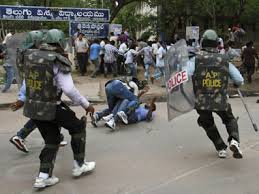 Hyderabad, Jun 14: In high drama, two MLAs belonging to the Telangana Rashtra Samiti climbed the Legislature Party building in the Andhra Pradesh Assembly premises and threatened to jump off if Telangana state was not created immediately.
Hyderabad, Jun 14: In high drama, two MLAs belonging to the Telangana Rashtra Samiti climbed the Legislature Party building in the Andhra Pradesh Assembly premises and threatened to jump off if Telangana state was not created immediately.
The other MLAs of the party burnt an effigy of "Seemaandhra government" near the legislators' entrance gate in the Assembly premises.
Holding black flags, the two MLAs - K Sammaiah and D Vinay Bhaskar - climbed the terrace of the G+1 building and also demanded that all the Telanagna protagonists arrested by police in connection with the 'Chalo Assembly' programme today be released immediately.
Assembly marshals brought the two MLAs down after an hour.
The AP Assembly was, meanwhile, adjourned for the day without transacting any real business as TRS, TDP (Telangana Forum), CPI and BJP legislators disrupted the proceedings on the statehood issue.
Two adjournments did not restore order and when the House re-assembled the third time, Speaker Nadendla Manohar asked Finance Minister Anam Ramanarayana Reddy to move two Bills.
After the formality was completed amid the din, the House was adjourned for the day.
Around 20 TRS, BJP and CPI MLAs, who were sitting at the two gates of the Assembly after it was adjourned, were detained.
Earlier, the Telangana issue stalled the Assembly proceedings which resumed its budget session on Monday, even as Hyderabad city remained "sealed" in view of the 'Chalo Assembly' call given for today by statehood protagonists.
The Assembly proceedings were adjourned twice this morning as TRS and TDP MLAs from the region stormed the Speaker's podium demanding immediate creation of a separate state.
Sporting black T-shirts, TRS MLAs were up on their feet as soon as the day's proceedings began and demanded that Parliament immediately pass a bill for creation of Telangana state.
The TDP legislators from the region joined the issue, forcing the Speaker to adjourn the House for 30 minutes.
The BJP and the CPI joined the TRS and the TDP members in the Well of House when it re-assembled after an hour.
With no sign of order even after he made repeated appeals to the protesting members, the Speaker adjourned the House for another half an hour.
The treasury benches wore a deserted look as most members, including Chief Minister N Kiran Kumar Reddy, Deputy CM Damodar Rajanarasimha and ministers, did not enter the House.
Only three ministers could be found inside the House as the Opposition din continued to paralyse the proceedings.
Leader of Opposition N Chandrababu Naidu did not attend the session as he was leaving for the US on family work.
Earlier report:
Telangana protest: Hyderabad turned into a fortress, 10000 policemen deployed in view of Chalo Assembly protest
Hyderabad, Jun 14: The Andhra Pradesh State Road Transport Corporation (APSRTC) has regulated its services, while the South Central Railway has cancelled or partially cancelled its local trains.
The Andhra Pradesh capital was today turned into a fortress with 10,000 policemen from the state and 2000 Central paramilitary force personnel deployed in view of the 'Chalo Assembly' protest called by pro-Telangana parties.
Police have denied permission for the protest and imposed prohibitory orders in the limits of Hyderabad and Cyberabad Police Commissionerates which will be in force till 6 AM on June 15.
A number of roads leading to the Legislative Assembly in central part of the city have either been closed or traffic diverted. Office-goers and others had a tough time in view of the restrictions.
The Andhra Pradesh State Road Transport Corporation (APSRTC) has regulated its services, while the South Central Railway has cancelled or partially cancelled its local trains. A number of educational institutions have declared a holiday today.
The students of Osmania University sought to march to the Assembly but they were stopped by the security personnel.
Fearing law and order problems, about 10,000 policemen from the state and 20 companies of central para-military forces comprising 2000 personnel deployed for security arrangements.
TRS, BJP and Telangana Joint Action Committee (JAC), under whose auspices the protest is being organised, have alleged that the Andhra Pradesh government has "unleashed repressive measures to put down the Telangana agitation." Maintaining that they intend to organise the protest peacefully to voice the separate statehood demand, the leaders of TRS, BJP and the JAC had sought permission for the rally from the government.





Comments
Add new comment